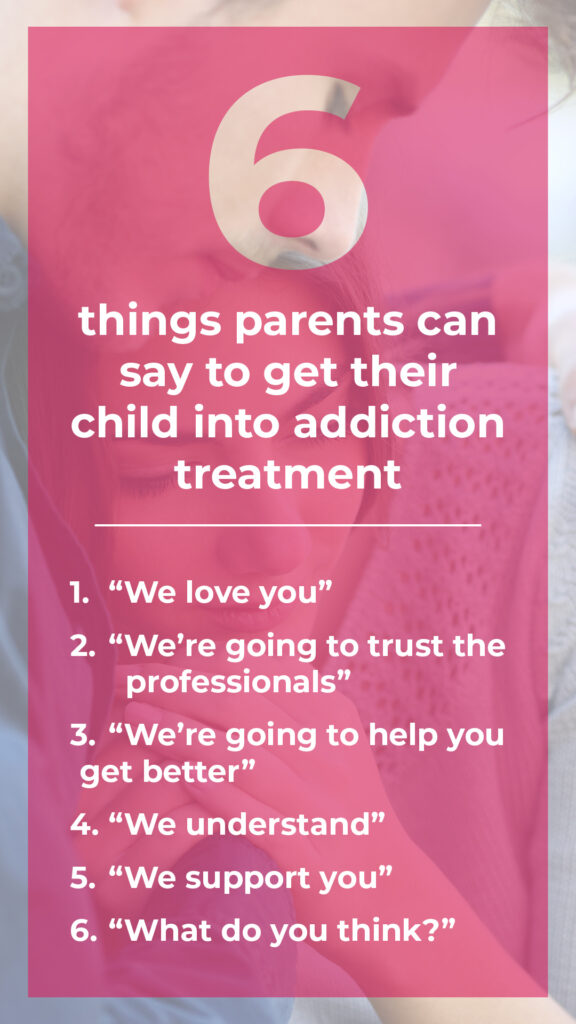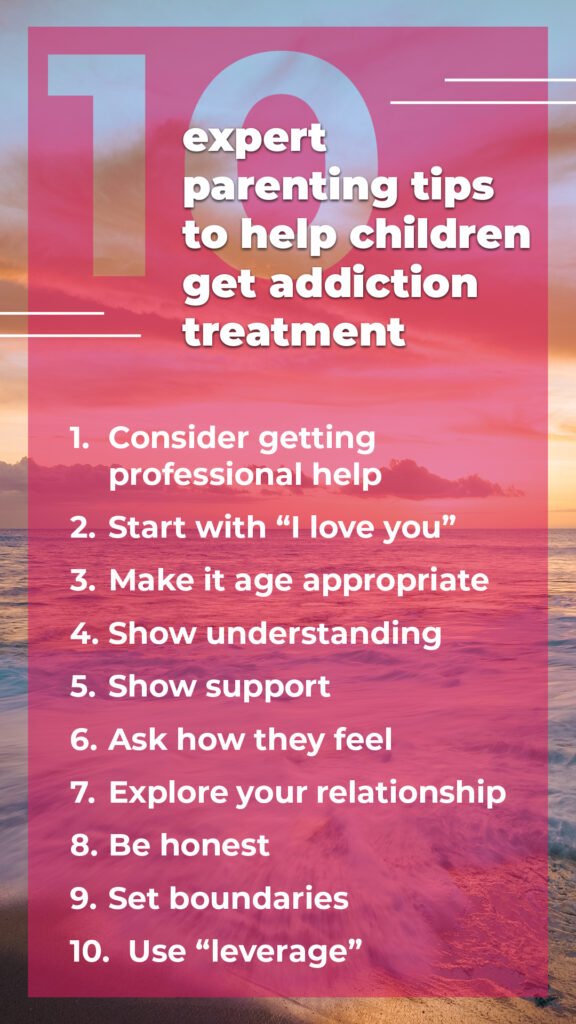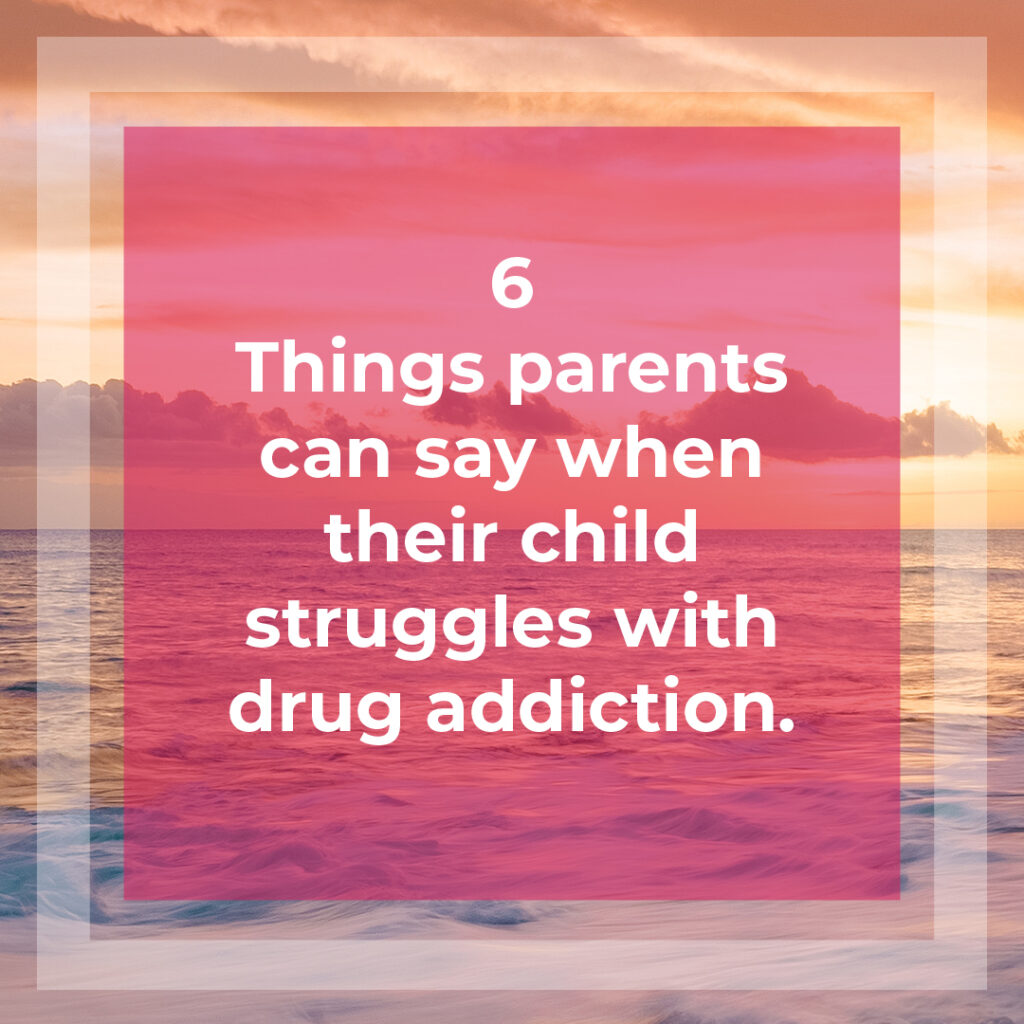Knowing what to say to get your child into addiction treatment can be difficult. Once you’ve identified the signs of addiction in your child, the next step is getting professional help. However, going to residential treatment for a drug or alcohol use disorder can sound scary to a child.
What can parents say to children struggling with addiction?
What parents say and how they talk to their children about going to addiction treatment is critical. Depending on how you approach the conversation, your child might get angry, sad or deny that there’s a problem. However, if you’re equipped with the right information and support, you’ll be in a better position to get your child the help they need to overcome their substance use problems.
Parents may need to “be sneaky,” suggests John Lieberman, administrative director for Visions Adolescent Treatment Centers, a mental health care provider in southern California. Parents need to find out what the right treatment method is for their children before they have a conversation about getting treatment.
“I recommend that parents do a lot of investigation,” Lieberman said. “Go visit the treatment center, talk to people at the treatment center, talk to parents who’ve been to the treatment center. Check things out and have a good understanding of what’s going on there so they can be confident in their decision. If we have the information as parents, then we can go back to my child and say, ‘We’re worried. We want to get some help. We want to work on this.’”
10 expert parenting tips to help children get addiction treatment
We gathered tips on how parents should talk to their children about addiction treatment from Lieberman and Micheal Walsh, director of clinical outreach at Landmark Recovery and a certified intervention professional. Together, they helped create 10 things a parent can say to get their child into treatment.
Consider getting help
A lot usually happens before parents are ready to stage an intervention and talk to their children about treatment. However, when a child’s substance use puts their life in danger parents have to decide if they’re equipped to handle the conversation.
“Many times, the best thing a parent can say is to ask themselves if they’re the best person to talk their child into treatment, or should they get outside help,” Lieberman said. “What does that outside help look like? There are different people trained to work with kids who can either help coach a family and the parents in the best way or come in and intervene themselves.”
Some people might view hiring an interventionist or sending children to treatment as signs that the parents haven’t done their job or have lost control of their home. Many parents might even blame themselves for their children’s addictions. Lieberman said parents who find outside help for their children recognize that this is the best option for their long-term health.
“I’ve had parents say they tried to make decisions for themselves before and it wasn’t helpful,” Lieberman said. “It wasn’t helpful, because that’s why we’re here now. So, we’re gonna’ trust the professionals right now and that’s our commitment.”
Start with “I love you”
Warmth and affection can do wonders for parents. Research shows that parents who show their children affection can improve their health and well-being, which can play a huge role in how receptive they are to treatment. A 2019 study published in Social Science & Medicine found that people who experienced warm, affectionate parents during their childhood reduced illness.
Therefore, parents who simply say “I love you” to their children in the middle of a tough conversation about treatment can help them understand the desire to see them overcome their addiction.
“What I say to a parent is what they really want to say is, ‘I love you,’” Lieberman said. “That’s the most important place they can come from.”
Make it age appropriate
There are many factors to consider as parents approach conversations with their children about treatment. Lieberman used age as an example of how the conversation will look different for each child.
“If I’m talking to somebody about to turn 18, their comeback to going into treatment is, ‘I don’t care. I’m just going to move out, anyway. My parents can’t make me do anything,” he explained. “With a 13-year-old, they might just respond emotionally and struggle to deal with distress tolerance that they run out of the room or out of the house when confronted with the idea of residential treatment.”
Professionals like certified interventionists can help parents tailor the conversation in a way that frames treatment as a long-term health benefit, rather than an idea that scares them.
“You don’t tell a four-year-old that they’re going to meet a doctor or somebody they’ve never met before,” Lieberman said. “Having professionals there to help and support but also being able to recognize that kids who are struggling with substance abuse issues, we have to say, ‘we’re going to take you to the doctor, and we’re going to help you get better.’”
@landmarkrecovery #greenscreenvideo Kids understand more than we think!! #toughconversations #kidsaresmarterthenyouthink #kidsgetit #kidsseeyou #hardconvos #talkingitouthelps
Show understanding
Parents can often project their past experiences on their children, Lieberman said. However, it’s important for parents to ask questions and have open conversations about any underlying issues that might’ve caused their children to turn to drugs and alcohol.
“It’s important for parents to understand the significance of things going on,” he said. “If there’s a recent divorce, traumatic situation, a parent who has their own substance use or abuse issues, learning disabilities or other mental health issues, there’s interference. We gotta’ look at the kids like this is what we’re dealing with in real-time.”
Show support
Addiction can be uncomfortable to talk about. For children using drugs to manage the “stress of life,” Lieberman says parents must show a united front and be ready to help at a moment’s notice. Otherwise, their children might not feel supported and resist the idea of treatment altogether.
“Make sure that there’s unity between the parents, Lieberman said. “Everybody in the room has agreed that this is the direction we’re going, this is how we’re going to start the conversation and this is when we’ll start the conversation. As soon as there’s no unity and there’s conflict and dysfunction, the child will absorb that and model that.”
Ask how they feel
It’s beneficial for parents to involve their children when it comes to finding the best treatment option. Research shows that the more involved parents are with their children, the more they can positively influence their decision-making and reduce their risk of addiction symptoms later in life. A 2012 study published in the Personality and Individual Differences Journal concluded that involving children in decisions that affect them has several benefits that include:
- Self-regulation skills
- Decision-making skills
- Reduced risk for long-term substance use
“It is ok for parents to get some input from their child,” Lieberman said. “[They can ask] ‘how do you feel about how things have been going?’ Usually, the child will either say nothing, or they can recognize that things aren’t good. We can’t keep going this way, and we’re trying to figure out a way that things can be different.”
Explore your relationship
As parents think about what they can say to get their children into treatment, Lieberman said it’s important for them to question family dynamics.
“Parents have to weigh if they have the kind of relationship that their child will come along [to treatment] even if they’re not happy about it,” he explained. “Sometimes the energy is built around the family dynamics. Because mom or dad is the problem, the interaction has become so volatile and emotionally charged. We don’t want a child in a crisis moment away from safe, parental support.
That’s when sometimes having an outside person who has a relationship with that child who can step in and say, ‘hey, I’m worried about you. Why don’t we get some help.’”
Be honest
In a Parent Cue article, Dan Scott wrote about the power of the phrase “I don’t know.”
“Not all questions have simple answers,” Scott wrote. “What if we said, ‘I don’t know, but let’s try and find out together?”
That idea is what Lieberman said parents can use to guide a child through a conversation about treatment. It can also get children to understand that it’s ok to ask for help when you don’t have all the answers.
“Sometimes it’s good for a parent not to have all the answers,” Lieberman said. “I don’t know what it all looks like right now, but we’re not going to keep doing this. We’re going to get some help. We want to change the family, and I want to be part of that change.”
Set boundaries
Addiction in general is a disease where parents, family members and friends often make excuses for their loved one’s behavior. Some people do it without realizing they’re enabling their loved one’s addiction. For parents who fall in this category, Walsh said many of them struggle to set healthy boundaries and enforce rules when they’re crossed.
“I find that a lot of parents want to be the friend of the child,” Walsh explained. “One of the problems parents have is they make statements like, ‘if you don’t X, I’m going to Y,’ and they don’t hold those lines,” Walsh explained. “Parents need to draw healthy boundaries, have honest conversations with their children and then be the parent.”
Use “leverage”
Walsh says parents have the leverage they need to get their children into addiction or mental health treatment. There are state laws that parents can use to force their children into treatment against their will. According to the National Alliance for Model State Drug Laws (NASMDL), 37 states and the District of Columbia currently have laws in place for the involuntary commitment of people suffering from substance use disorder (SUD), alcoholism or both.
“If they’re under 18, they don’t have a choice,” Walsh said. “If their parents or legal guardians say they’re going to treatment, then they have to go to treatment.”
Parents also have the ability not to support their children if they don’t agree to get help.
“Most young adults are financially dependent on their parents,” Walsh explained. “That’s a lot of leverage; emotional leverage, intellectual leverage. If they don’t change, [parents can say], ‘I’m not going to pay for college. I’ll put this money aside into a treatment fund.’ It’s one of the things that parents can talk to their kids about.”
Trust the professionals at Landmark Recovery
If you know someone living with addiction or mental health illness, call 888-448-0302 to speak to a recovery specialist. In 15 minutes or less, you’ll be connected to a dedicated team member at Landmark Recovery. They’re available 24/7 to help you with tips on how to explain addiction to a child, for example.
Visit our blog section to find hundreds of helpful articles that could also answer your questions. If you prefer an in-person visit, go to our locations page to find a treatment center near you.

Choose Recovery Over Addiction
We're here 24/7 to help you get the care you need to live life on your terms, without drugs or alcohol. Talk to our recovery specialists today and learn about our integrated treatment programs.







